Colorama is a micro-press/Risograph printer from Germany. Its diverse catalogue will never disappoint. They also publish one of my favorite comics anthologies ever, Colorama Clubhouse. During annual Colorama Clubhouse week, a dozen of artists from all over the world gather and produce the anthology together. I interviewed Johanna Maierski of Colorama who runs everything -- including the food and accommodation for artists at Colorama Clubhouse week.
 Kim Jooha: How did you start Colorama/Risograph printing? Your background is architecture. I also remember you used to distribute some zines that were not published/printed by you. Could you explain how it evolved?
Kim Jooha: How did you start Colorama/Risograph printing? Your background is architecture. I also remember you used to distribute some zines that were not published/printed by you. Could you explain how it evolved?
During my architecture studies we had to make a printed documentation of our projects for each semester and I found making these much more interesting than the actual design process! A friend of mine had a risograph in his bedroom and that’s where I printed my first zine, while him and his girlfriend cooked dinner for us. I think it was this first experience of genuine generosity and support that comes with this machine somehow - I just brought my own paper and went home with 30 zines.
I started Colorama with a friend back then in the last year of my studies. Initially we just wanted to print our own zines and do some small projects for clients to pay our rent but I realized really quickly that to make it work, you need to take the whole thing seriously. There’s this huge gray zone between being able to make some quick, cheap, a bit shitty prints on a riso and to make something very beautiful and elaborate. I wanted to do the latter. My friend stopped after a couple of months because she was merely interested in doing design work (something she is super good at) and not any administration or service (which is a huge part of a printing studio unfortunately).
I started with the distribution because I loved all those other books that were out there and I had something like “Good Press” in mind. It was also a good starting point to get into a conversation with the artists I loved - I realized that a lot of them don't really like if you just contact them and tell them “I love your work“ - it's always better to have some sort of exchange.
I got invited to Offprint London when I had published three books or so and thought “Wow! I’m really out there!!“ but of course they were also just acquiring people to rent all the tables as any other business. You could say my vanity brought me into book fairs and then I just applied for the LAABF [Los Angeles Art Book Fair] in 2017. I published 10 new books until then and got in first contact with everyone from the riso and comics scene. I was starstruck and super excited.
I met with Sammy Harkham for a coffee back then, and showed him all the books I had published. He encouraged me to go for it and do it right. He asked me, “Do you know any German publishers that does what you do on a bigger scale?“ And I said “there’s very few”, so he said “Then you have to do it.“ His opinion meant a lot to me - and I took it very serious - and there you go: Colorama was born.
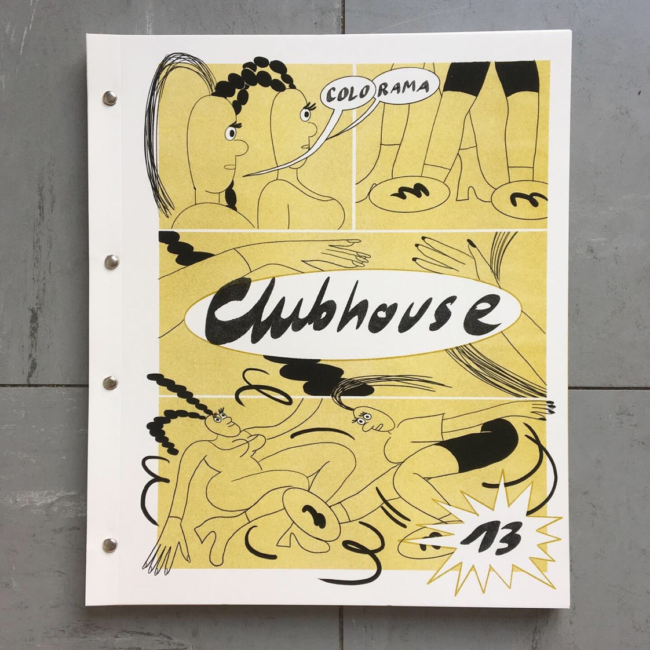

How did you get into comics? Did you like comics before Colorama?
My father is a Donaldist, which means that he has the full collection (of mainly Carl Barks) Donald Duck comics in German and in English. Each month we would get an envelope and my three siblings and I would read them religiously. I like how Donald always puts his mind to a new job and becomes really really good at it. He is a masterly cook, smith, jockey, detective, chicken farmer or circus director … until he gets unlucky. But he just teaches himself to be a professional in that field and he succeeds (at least for a while). I like this idea because I see myself as a self-made duck too. In the bathroom of my sisters and I there was this panel from a Donald comic that my father had copied and cut out. It’s from a scene of a gathering of parents where they talk about how to raise their children. You see these snooty ladies - one of them saying “I raise my daughters on those principles: Rich in forsaking, strong in bearing and restless in working. I resent immoral gadding around.” My father thought that was hilarious. His repetitive life rules were “Never trust doctors, teachers and policemen!”
So from the beginning I thought that comics were hilarious but also a very serious genre that taught you life lessons. I started reading Alt Comics when I was a teenager, going to the same shop in Kreuzberg, Berlin all the time and learning about Daniel Clowes and Julie Doucet and the Hernandez Brothers.
I would buy a lot of anthologies to get to know as many comics artists as possible. And when I found one that I liked I searched everything for solo titles. I remember a time where I asked them every month if they had something new by Gabrielle Bell because I was obsessed with her comics.
When you start Colorama, did you plan to do both printer and publisher? How did the two jobs come together?
Initially I got the printer to enable me to print something, I thought about it in a very practical way. In general I need the back and forth between thinking and making. I get my best ideas when I just do something monotonously - my hands need to be busy to keep going, I need structure! I need deadlines and client work to maintain productivity. To sit in a studio all day and just having to come up with ideas would be a nightmare for me. I guess that my riso is keeping me sane, as dumb as that sounds. A big problem I had with my architecture and urban research studies was that most of it was so detached from lived space although it was all about lived space. The timelines and fictionality of the planning of a house or a whole block seemed completely irrational to me. I think urban planning has something theatrical and humorous about it which the scene is mostly denying though. They are very bound to scientific methods which creates a whole lot of “bubble work” for very specific elites. There is this publication called “Bauatlas” that is basically a collection of all the rules and DIN’s and details you need to know about building a house. There are whole chapters about excavators and which model is most suitable for which kind of pit or a chapter about bricks, including their patterns and sizes and history in drawing and text. Each chapter has an actual author who is presented with a biography in the beginning of the book. If you look at the years it was published it is being republished every couple of years because - of course - the technical aspects, machines, laws and materials are constantly changing, so they only publish a certain amount of books, aiming for them to be sold out and then rework the whole book to become something very solid, every couple of years again. I think this book is a great metaphor for me how the means inform the production of a book, and how a book as solid as it seems is something ongoing. I think being involved in the production is a way for me to stay connected to the content and to understand how it is transforming through my work. You could say that making books for me is building tiny houses.
How did Colorama Clubhouse Week begin? You also provide accommodation, food, and a half of flight fees, which is amazing. It must be a lot of work to coordinate everything for a dozen artists from all over the world.
Aisha [Franz] and I started Clubhouse with small sessions of 5 people because we wanted to connect the spread out scene of illustrators and comic artists that live in Berlin but don't know each other. The comics scene is such a global village. People talk for hours on Instagram and follow each other in awe and never really have an opportunity to meet and get to know each other in real life. We wanted to create a safe space where they can share experiences or practical tips and most of all where they can talk about their work. Illustration and comics are such personal fields, sometimes it’s very hard to say something other than “it’s very beautiful“ because you don't know how to express it without hurting the other person or make them feel misunderstood. We thought that by preparing a poster for the other person, they would open a dialogue and it would be both a comment on the other person's work and sharing of your own view so everyone could feel equally exposed.
For the bigger Clubhouse that Aisha and me are hosting once a year, we just wanted to create something that would also work with artists that live much further away. Although the focus is on the exchange of the artists, we understood that it's important to have some sort of exchange with us as well to create a good atmosphere. Since we don't have any grants for the project (yet) and it's only financed through the sales of the book and the merch, we thought that it's really important to be good hosts at least. Cooking for them is a really big factor in this. In the first year everyone paid for their own flight and accommodation, now in the third year we paid half of their traveling costs and paid for their rooms. It's really tight and the whole setup is quite maniac. I really need to trust in the books being sold for it to work out. Also the whole production evolved a lot. We are now a team of 3-4 amazing people (they really make the whole thing work) who are all printing and finishing the book. In the first year I did the printing alone. Everyone is unpaid, though. Everyone loves to be part of the experience, the artists, the interns, Aisha and I. It's a very intense and beautiful week and at the end no one wants to leave or questions if it’s a viable project, but when I reflect on it later I have the aspiration that everyone should be paid for their work - and not only in food and love.


There are many comics anthologies, but I think Colorama Clubhouse is one of the bests. I love how it contrasts/compares two adjacent works/artists with the same motif because I think dialectics is one of the principles of comics. How did you come up with the idea of having an illustration then having a comic inspired by it?
It came from the idea to start a conversation about everyone's work. As an artist you spend so much time alone at your desk but I think it's super important to be out there and talk to other people about the stuff you create. I am convinced that your work gets better if you are open for input and I'm also convinced that your work gets better if it’s informed by the thing it's going to be: a book! To let one group create a poster and then the others respond to is a way of forcing them to open up to another perspective on colors, drawing techniques and also content. Aisha and me choose the pairings very thoughtfully - sometimes we see something in an artist that we want to trigger with the poster we assign to them, sometimes there’s a more subtle connection. We formulate a text about each artist and explain the pairing a little bit to start the process and give a tone, which is probably one of the “tender-narrator“. We make very clear to them that we didn't “book them for a style“ but that it should be a space for them to try something they’ve always wanted to make. To make something based on someone else’s work is probably a good starting point for that, to rattle old structures. We have this part in the introduction that sums it up quite nicely, I think. “What makes the process of working together in one space so special is that something as labour intensive as a book comes together very intuitively and cooperatively. It pushes each participant to explore new possibilities and ideas within their own work. We believe in collaborative work – we believe that the upright walk with a like-minded individual loosely holding your hand will sharpen your thoughts, strengthen your practice and soothe your self doubts - ultimately emerging into something new, exciting and rewarding.“
How did you start working with Aisha Franz? She’s really involved in Clubhouse.
I was a fan of Aisha’s work before we had met. I invited her to my studio to distribute some of her zines (my good old trick, haha) - we met for a coffee shortly after to talk about a workshop we could do together. After that first date we both went home and told our partners, “I met this cool woman, I want to be her friend.”
Aisha is crucial for Clubhouse. Not so much for the structure or organization but very much in the Art direction and the creation of a good atmosphere and of course to bring the whole book together! Aisha and me are very different, we are quite the opposite actually - once we looked for our compatibility based on our astrological signs, it came out that our only compatibility is our “sexual energy” hahaha. It basically said that our pairing is either bound to result into complete disaster OR it could result (under rare occasions) into a creative power couple. We somehow found a way for the latter and I rely and need her opinion in basically all the things that are happening in my life - would it be work related, or about family or love.
Aisha and I really grew together in the past years and I learn a lot from her, most of all to be more accepting. I consider her and her daughter Ellis to be family. We recently decided that Clubhouse was taking too big part in our friendship though - Aisha is working as a freelance illustrator, she is trying to work on her new book, she is participating in exhibitions and anthologies here and there and then there is also Clubhouse and not to forget Ellis. It has been a little bit much so we will see how we can collaborate in the future. Right now it seems that Clubhouse should find a structure that is more reasonable for the people that put in all this labour, because it’s a beautiful big monster we created there, that needs a lot of attention and maintaining.


Which work was the tipping point of building Colorama as it is now?
I think there are three titles that manifested something for me. One is Clubhouse #6, the first big one. To feel the interest and enthusiasm of both artists and audience for this project was very reassuring. The other one is GAIA7 by Marc Hennes and Paul Paetzel. It was the first “book” book. When it came out and we held it in our hands I was the proudest and most excited I have ever been about a publication. We were all super involved in it and every detail from paper to title-page was very thought through. An additional one is probably DUI by Tara Booth. Not many know that the first edition of the book was the first book I ever published for an artist in 2017. Back then the buzz about her work wasn't quite as big as right now - when I held the second edition in my hand this year it showed me all the things I had learned about making a book since then but also my progress in how to work with artists.
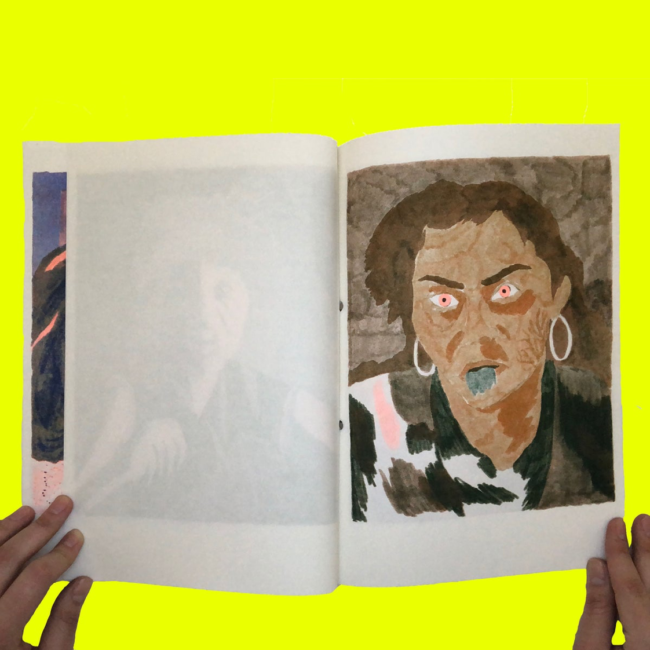
What do you think is/are some under-appreciated Colorama publication(s)?
I think people are really missing out on Zombie Girls 2.0 by Lucie Lucanska. I published it this year in spring and I was a bit confused how little reaction it got. I think Lucie’s work is very witty and unique. The binding she came up with is just summing up everything you need to know about her - it's a great book!

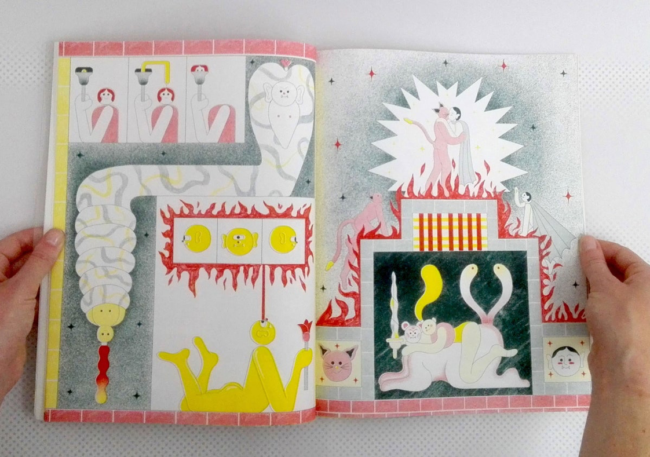
What is/are your most proud publication(s) so far?
It’s definitely Clubhouse. It just manifests our growth and sincere commitment to comics, collaboration with artists and production: It has something really pure and powerful for me, it's sort of my baby. If I look at the old issues it makes me laugh. Clubhouse #6 is completely bonkers, its huge and super full, you can't really navigate it you just have to dive into it. I think one thing that all publications have in common and might make the Colorama titles compelling (but also will keep them a little bit “crafty” until forever) is my will and fearlessness to try things - not to polish and look at them too long but just to jump into the project. I think this is something that shines through and connects to people. You could say that I am proud of that specific quality in all the books.

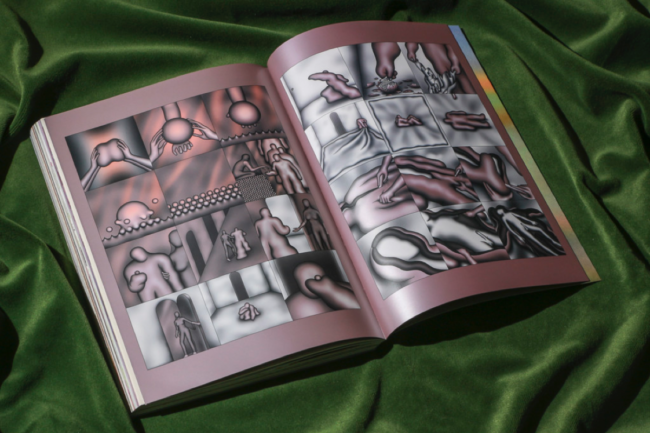
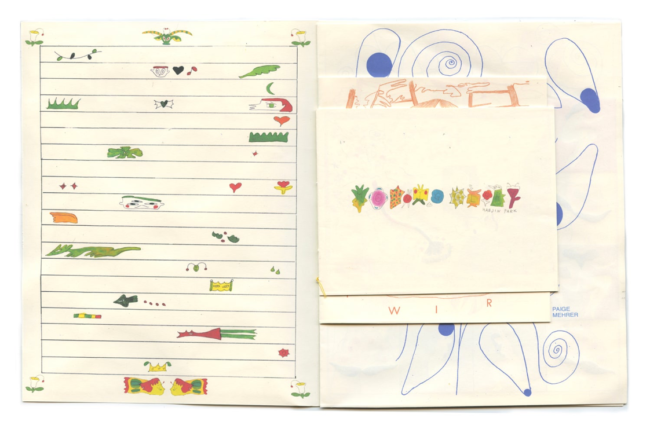
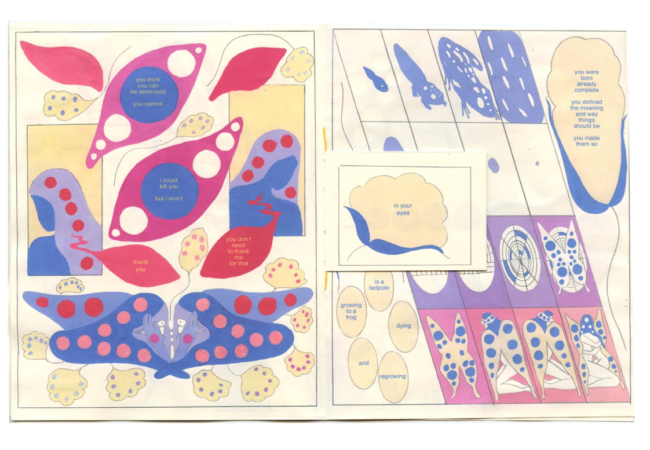
Any books/zines from other publishers that you wish you published?
Grip by Lale Westvind published by Perfectly Acceptable press is just the best riso comic I have ever held in my hands and read. But it’s such a “perfectly acceptable” book - it has Matt [Davis] all over it - it is perfect and impressive! It's funny because when I think about it, all the books are so specifically from the publishers - if I had published them it wouldn't have worked the same way. I love all books by Breakdown Press, I am very impressed by Lagon Revue. They take a lot of time to put their anthology together and its printed to perfection. I am not sure if I had the patience to dedicate myself to 40 pages for 4 months though (I think this is how long Alexis [Beauclair] worked on the risopages for the current Marécage). I love Plum Press, these girls are just super cool, they don’t need any publisher though, they are already killing it!

I really love your architectural drawing zines. I’m interested in the intersection of comics and architectural drawings. I know that it's a busy job, but do you have any plans to make your own art more?
Oh my. I am very happy that you like this book, I honestly like it too, but I don’t really know how my drawing thing works. The last thing I drew that I think is really good was a zine for my girlfriend. The drawings are fun and interesting but they are so good because the whole thing expresses that I love her and everyone who would read the zine could see that. I am not this person that doodles all the time and can make a good drawing instantly. I really have to unload something highly charged - so I stick to writing at this moment. It’s faster and I can do it from anywhere and I write something good here and there that sticks with me. I see so many people that do something similar to my “architectural style” but just way more to the point. It’s not a problem for me that someone could do it much better -- I would just ask them to make a book with me then. Publishing books of other peoples’ works that I admire is for some reason more satisfying and exciting than publishing my own work. I think I’m just a better editor than I am an artist and I can see that artists like to work with me and in some cases it even pushes them in their work. I love that!
How do you decide which artist/work to publish? Do you consider sales prospects of the work when you make the decision?
I try to pick up artists that are daring something and doing their own thing. And preferably those that are yet unknown or on the brink of becoming more known. But of course I have my heroes that I would publish in a second if they were willing! Sometimes when I see someone’s work and it’s not there yet, I contact them and ask them if they would be interested to do “this and that”. If I see that they are open to work with me I would move forward with it. If I can feel that the person just wants to deliver a finished work and is insulted about any kind of comment, I back off. There are some projects that are of course financing others but there are always exceptions. When I invited Marie Weber to Clubhouse last year, few people knew her work. Then I made a zine with her and people bought it worldwide! I thought it would be a slow burner, but people just really like her stuff. Something like this makes me very happy. Recently I got offered something that I knew people would eat up, but I just wasn't convinced. If you publish something you don't really stand behind, it will fall back on you - I’m quite certain about that. That's the reason I don't like anthologies with 27390 contributions. How can you honestly edit this or actually be involved with so many peoples’ work? Is it just a collection of oversized business cards? I don't get it.
Who are some heroes you want to work with?
I had this list for a long time that included, Olivier Schrauwen, Sammy Harkham, Julie Doucet, Gabrielle Bell, later Anna Haifisch, Antoine Cossé and Lale Westvind… with some of them I have worked already or am still working with. Right now my personal hero is Oda Iselin, we are planning to make a book together since a year now I think. I am pretty sure that she is the next big thing and if publishers are not doing it already they will soon run in her door. I really enjoy working with Ollie too. He is very interested in what is going on around him and he is looking for real conversations about his and other people’s art. Every time I spend time with him, I go home after and have the urge to finish some of my short stories. He is an excellent writer too. He constructs narratives really masterly, it is a complete joy to read his books! To be able to publish him makes me very happy. The first time I met him I just gave him compliments for his work and it was really awkward. I understood much later, that you actually need to engage with the person and give them space to talk too rather than just unloading your admiration. It’s a one way street otherwise and it makes the artists feel like you are only projecting on them. I observe that a lot with fans of Tara’s work. They come to her table and say “I just wanted to tell you that I am your biggest fan, I follow you for ages, you are amazing!” and then they leave without buying anything, filled with bliss. With admiration comes entitlement that the artist needs to listen to you and also be the authentic person that your perceive them as. I think if you have a “hero”, support them! Offer them something too and don't just indulge in the connection you “feel”. They are hardworking people, fans should respect that more.
Colorama publishes not only comics but also art books/zines like other Risograph printer/publishers. Do you think about this distinction? Do either sell/be received well in other fairs/audiences?
This eclectic selection of books I publish is something I really like and I want to stick to. I know that it's always easier to digest if you have this clear brand and people can see that you made this books from miles away but I want to stay open. If someone is a good photographer or writer or poet I am interested in all of it! I just like projects that are sincere and humorous. I am fascinated how people follow this loooong strain of thought and are able to pour it into something that makes sense. The projects that I like the most are the ones where I feel completely unable to understand the process of how they were made. Even when I follow Aisha creating a story, I have no clue what's going on in her head. Also when I watch Stefanie [Leinhos], stubbornly wading through her tangled concepts to create something so pure and astonishingly simple at the end - I don't understand how she makes that jump. The interest in my publications varies from town to town honestly - in Paris they are more into the graphic and abstract stuff but in Angouleme they love the comic comics, in NY they love prints and “conceptual” stuff and in Chicago they love everything.
Do you like tabling at fairs?
I love tabling at fairs. It’s like this global family that I see more often than some of my friends. But it took me a few years to understand that it’s not only fun but also work. It's very exhausting but immensely rewarding. Spending 2-3 days next to people you love, munching snacks and giggling about the newest gossip…it's like a short summer camp! And then you get to meet all those exciting artists from all over the world. The fairs are one very big factor that will keep me in this scene for a long time! But also the thing that will put me into my grave hahaha. I had to promise to Stefanie that I will table less because I have been sick a lot after travelling so much. But then I look at the lineup of CAB and I get huge fomo [fear of missing out]! I wish I could be there in person and go to this weird secret project robot bar at the end with everyone and drink cheap margaritas but I can’t fly in and out of the States. Its too much! I need a private jet like Leonardo Dicaprio.
Is there any difference between European/German and North American artbook/comics scene?
Oh yes. For a long time in Germany there seemed to be only this scene for scrubby punk zines with bad art and super high end Art Books and nothing in between. This changed in the past years due to some new fairs coming up and also more international artists moving here! The only comic fair in Germany where you actually have international publishers and artists is the Millionaires Club in Leipzig. The comics festival in Hamburg is also very nice but it’s a more local thing. People in Germany are more competitive and cheap, they don't understand that the money is circulating among all of us. They come to your table and ask a bunch of questions how you made this book and then they leave. This is also the reason why I don’t table at many german fairs. In Europe it’s very different from country to country. France is obviously comics capital and I love to go to fairs there, United Kingdom too! In general it feels like the scene in North America is more connected, also outside of the fairs. People support each other and they create their own little worlds, like Zine Not Dead in Chicago. I wish we had more things like this here, we did our first big comic reading during Clubhouse and people loved it although many were super skeptical how this would work. Also people from North America have this talent for public speaking and mingling and most of them are raised performers, I don’t know if they all went to debating clubs in high school but it’s a completely different vibe than at events here. It’s just more fun.
What are some challenges and benefits of running a micro-press?
It’s just overseeable and I can still do everything myself. I don't like to be dependent on institutions. I reached a point though where I am doing the job of three people at once which is not gonna work like this forever. The more books you make, the more money you make but also the more you pay for everything. When I hear what artists are being paid for their work with bigger publishers, I am sometimes really shocked though. Many would make a better deal if they just work with smaller presses because they get a bigger cut. Even if you don't have a distribution system set up, these days you will be found - people will buy your books online. It’s easier to be visible, you don't need a publisher that is touring you through the country anymore to get people's attention.
I find it hard to keep a balance of where I am at - it took me a while to stand behind what I do and to realize the benefit that artists have if they are published by me. If you see yourself “only” as a step between self-publishing and the bigger publishers it can be frustrating but I decided to see micro-publishing as its own system that is set up differently and works with its own rules that I really like, rather than aiming for it to become something else one day. But maybe I’ll change my mind if someone gives me a ton of money and I could work in a bigger scale - who knows.

In one of Instagram stories, you mentioned how people assumed your male partner was the publisher, not you. In another, you also mentioned how people underestimate you because you are a female. Could you tell more about these sexist experience? There are few female publishers in the field. Why?
Ah, that was when my friend Hugo from Terry Bleu was helping me out during the NYABF. People came to the table and started asking him questions - assuming I’m his helper. It was such a cliché! I am not very modest when it comes to specific qualities and I am also not quiet about them. I know that I have a good sense for artists and a good intuition to find them at the right moment. But it doesn’t make me walk around fairs and wink at young artists and say “I’ll invite you for a coffee and we make a deal, ok?”. (Which I see men doing all the time, right after they bought the newest Clubhouse to see what’s up.) Women are more likely to be sent off to “their space” and being scolded for being loud and confident. We all know that. The only thing I felt that I could do about that is trying not to reproduce this system myself.
I catch myself still being so proud of approval by one of the “elders” which is a little bit unnecessary. But this weirdly gendered value system is still a part of me. I think it’s important not only to work against a system but to offer something else instead. In the means you have. In Germany it’s much worse though than in the States. For example you still have male artists that are in their 30s and think its ok to be part of a show that showcases 30 men and 3 women. The reason of the curator being “I think maybe i just prefer male art”. People here are really uneducated about gender equality. They go to universities that are run by old professors that will be there until they roll into their graves. The whole education system is super patriarchal. This system produces those kinda boys that come with their mediocre work and try to sell it to me by half hitting on me. It’s really embarrassing. They should be sent back to life-school. I find it also very telling that from all interns that apply for working with me, its 95% women. They are eager and open to learn and respect someone else's expertise to teach them something. That's great but also dangerous for them - I try to show them how they can draw a line and at what point they should rely on themselves.
Would you recommend starting a publishing house or printer to others?
I think the question is more if you’re willing to start a business. If you want to publish some zines or print some stuff, anyone can and should do that! To set up a business that provides a living for you, pays the artists and produces wonderful books is super super super hard. And if you want that you have to be willing to write 2370934 emails, know your taxes and engage with others. Not everyone needs their own press though. The reason I am not an artist is that I am much better at what I am doing. But it's the same the other way around. I just tried to imagine a publishing house run by Aisha… you would get all your books wrapped in bacon and either immediately or two years later.
What are your next projects?
Aisha’s Publishing house…Haha, no. There are a few new books by Antoine Cossé, Max Baitinger, Conor Stechschulte, Lale Westvind and Oda Iselin. And I will publish Sunday for Olivier Schrauwen from now on. It will be 5 or 6 issues in total which is very exciting for me. I applied for funding for Clubhouse for the next two years and hope it will go through so I can finally hire Molly. I would like to do more teaching, this is something I really miss but I’m at least working on a Clubhouse summer school together with Conor Stechschulte that will hopefully happen in Chicago one day. My most urgent next project is a real holiday though. I want three weeks with Stefanie and a bunch of other women in some small town in France. The only question will be “who has to put on clothes to get cheese, wine and bread from the village close by.” Only novels allowed, no educational literature. And definitely no emails.







